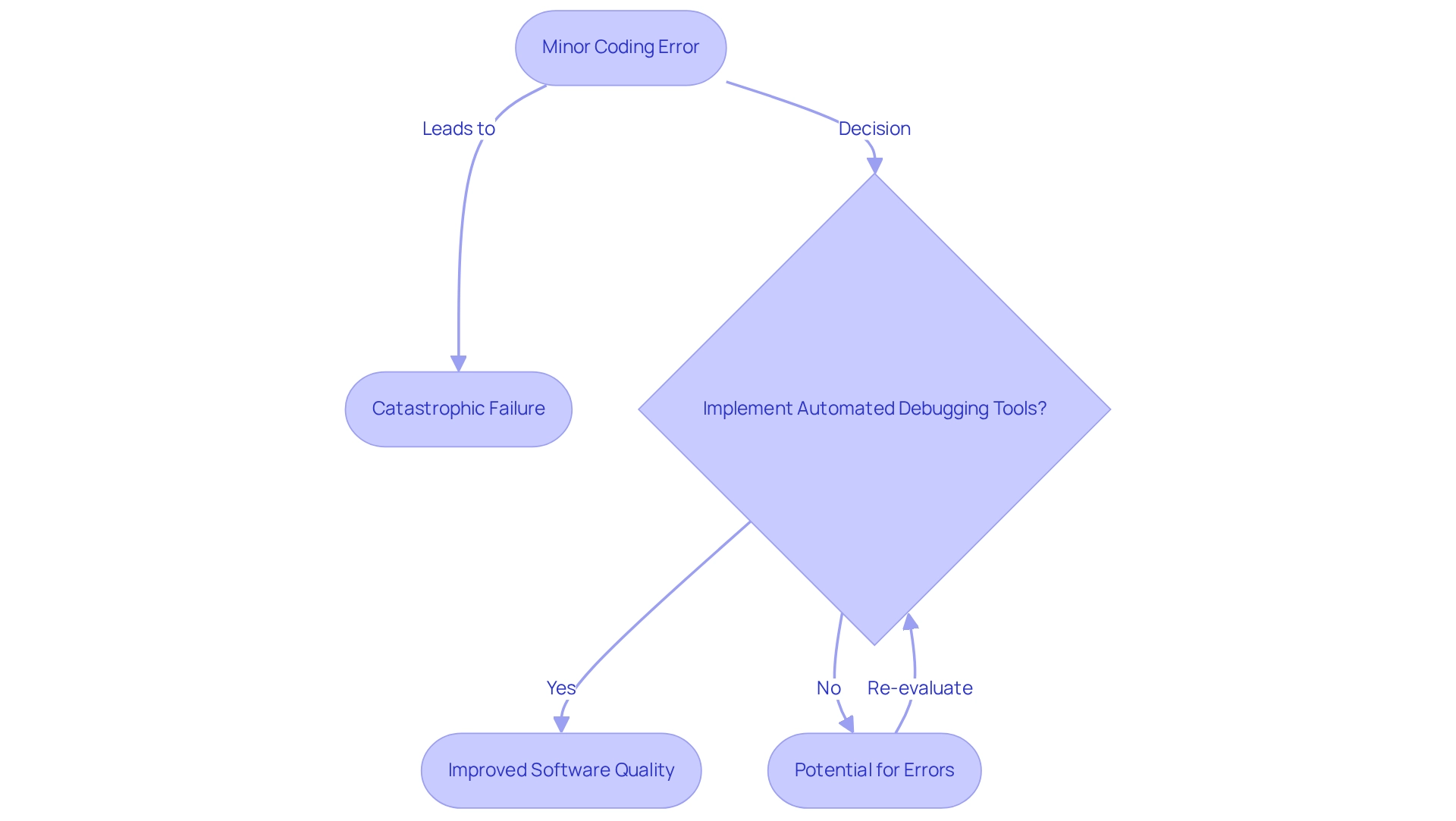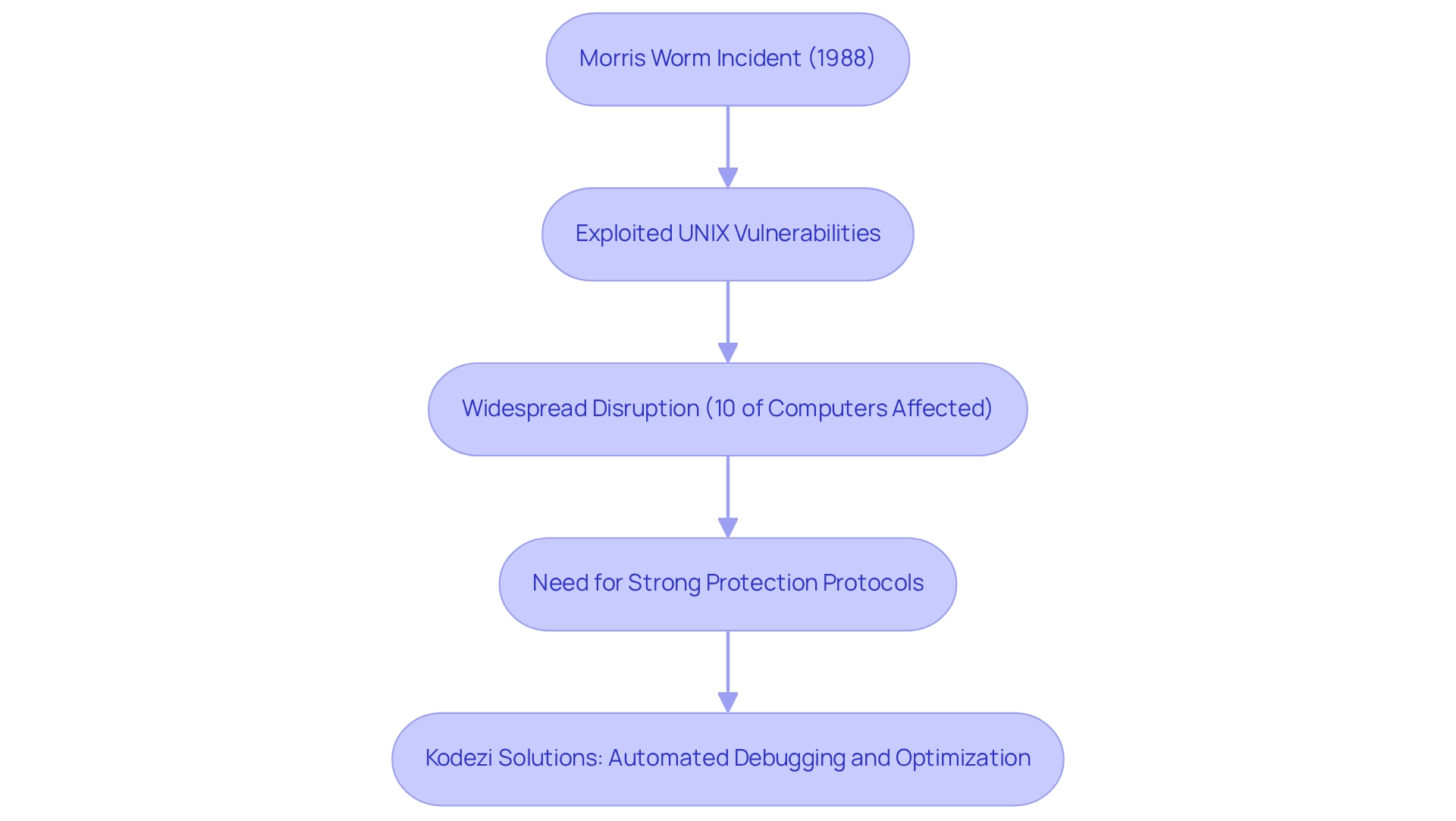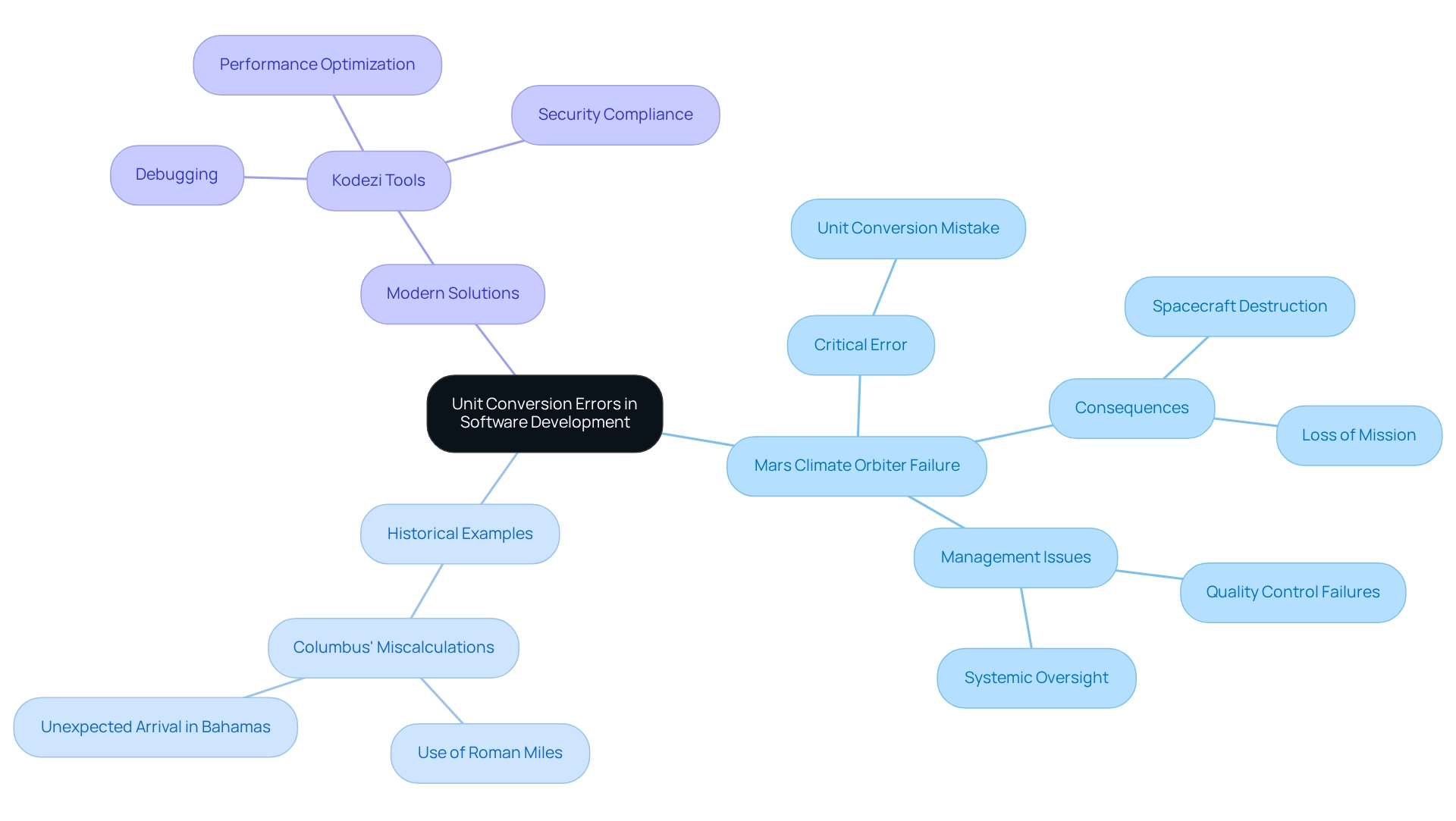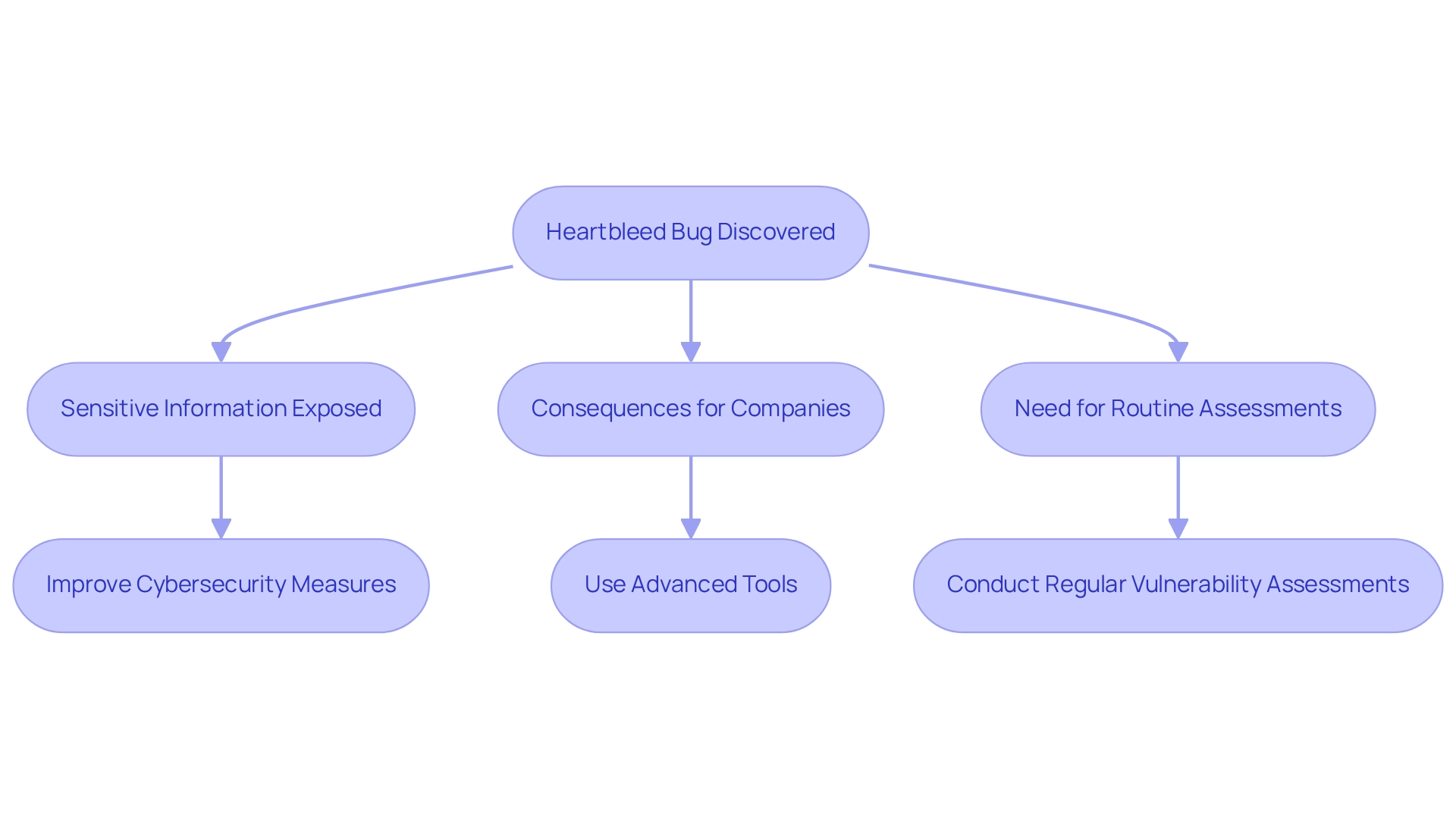Overview
The article highlights the ten most significant software failures in history, shedding light on the critical lessons learned from these incidents. Have you ever considered the coding challenges developers face? By analyzing notable failures such as the Mariner 1 spacecraft and the Y2K bug, it underscores the importance of rigorous testing and ethical coding practices. Furthermore, it introduces automated debugging tools like Kodezi, which can help prevent similar mistakes in the future.
How does Kodezi address these challenges? This platform offers specific features designed to enhance coding efficiency. For instance, Kodezi streamlines the debugging process, allowing developers to focus on writing quality code rather than getting bogged down in errors. The benefits of using Kodezi are clear: improved productivity and higher code quality.
In addition, consider how these lessons can impact your own coding practices. By adopting tools like Kodezi, you can significantly reduce the likelihood of errors in your projects. The article serves as a reminder of the past, urging developers to learn from these failures and embrace innovative solutions for a more efficient coding experience.
Introduction
In the realm of software development, the stakes have never been higher. History has shown that even the smallest oversight can lead to catastrophic failures and staggering financial losses. For instance, the infamous Mariner 1 spacecraft was doomed by a mere missing hyphen, and the multi-billion dollar fallout of the Y2K bug serves as a potent reminder of the critical importance of rigorous testing, meticulous code reviews, and proactive debugging practices.
Furthermore, enter Kodezi, a powerful tool designed to revolutionize the way developers approach code quality and debugging. By harnessing the capabilities of Kodezi's automated debugging and code optimization features, developers can enhance their productivity while safeguarding their projects against the costly pitfalls of the past.
As the software landscape continues to evolve, the lessons learned from historical failures underscore the necessity for robust solutions that ensure code integrity and ethical standards in development. Are you ready to explore how Kodezi can transform your coding practices? Discover the tools available on the platform to elevate your development process.
Kodezi | Professional OpenAPI Specification Generator - AI Dev-Tool: Streamline Code Quality and Debugging
Coding challenges can be daunting for developers, often leading to frustration and inefficiencies. However, Kodezi offers a robust solution that significantly enhances programming quality and simplifies debugging processes. Its Professional OpenAPI Specification Generator streamlines the production of API documentation, ensuring that developers adhere to industry best practices and ethical standards in development.
By utilizing the advanced automated debugging tools of this CLI, Kodezi identifies and resolves issues in real-time, which is essential for reducing the risk of system failures. This proactive approach not only enhances programming quality but also boosts overall productivity. As a result, Kodezi becomes an indispensable resource for developers eager to learn from the biggest software failures in history, helping B2B engineering teams focus on deploying code that maintains the integrity of their codebase. The platform independently improves code quality and addresses issues before they reach production. Furthermore, the UK Government's annual £20 billion investment in digital transformation highlights the significant risks in application development, where Kodezi can help save up to £7 billion by minimizing project failures.
Moreover, 76% of developers acknowledge that continuous learning and efficient communication are crucial for navigating software challenges. Kodezi empowers users to uphold high standards in their codebases while fostering a culture of enhancement and flexibility. To get started quickly, developers can utilize the '5 minute quickstart' and view a demo to experience its capabilities firsthand.
In addition, Kodezi effectively tackles performance bottlenecks and ensures security compliance, making it a comprehensive solution for modern application development. Why not explore the tools available on Kodezi and see how they can transform your coding practices?
Mariner 1 Spacecraft: The $18.5 Million Software Bug
Coding challenges are a common hurdle that developers face, often leading to significant setbacks. The Mariner 1 spacecraft, launched in 1962, faced a tragic fate due to a seemingly minor programming error—a missing hyphen in the guidance instructions. This trivial oversight resulted in a catastrophic failure, costing NASA approximately $18.5 million. Such incidents highlight the necessity for meticulous program evaluations and rigorous testing protocols in software development to prevent the biggest software failures in history.
How can developers avoid such pitfalls? Automated debugging tools like Kodezi offer a robust solution. With features including real-time analysis and error detection, Kodezi can identify and correct simple mistakes before they escalate into costly failures. Mary Shaw aptly noted that "less than 10% of the programming relates to the ostensible purpose of the system," highlighting the complexity inherent in development and the potential for critical oversights.
The benefits of using Kodezi are substantial. This platform has revolutionized the debugging experience for over 1,000,000 users, enhancing software quality and resolving issues before they reach production. Users have praised Kodezi for simplifying debugging processes, with one engineer stating, "I love what Kodezi is doing with debugging, feels like I just unlocked a new superpower!" Furthermore, the statistic that "simplicity does not precede complexity, but follows it" emphasizes how intricate code can lead to errors like the one that caused the Mariner 1 failure.
This complexity is not unique to Mariner 1; other aerospace missions, such as the U.S. Air Force's Milstar satellite program, have faced similar challenges due to programming mistakes. The failure of Mariner 1 is considered one of the biggest software failures in history, serving as a critical reminder that even minor coding errors can have monumental consequences. To prevent such failures in your own projects, consider implementing automated debugging tools like Kodezi. By doing so, you can help identify and resolve issues before they escalate, ultimately improving your productivity and code quality.

The Morris Worm: A Cybersecurity Catastrophe of 1988
Coding challenges are a common hurdle for developers, often leading to frustration and inefficiency. The Morris Worm incident of 1988, unleashed by Robert Tappan Morris, is considered one of the biggest software failures in history, serving as a stark reminder of the vulnerabilities that can exist in software. This worm exploited weaknesses in UNIX systems, causing widespread disruption and affecting around 10% of internet-connected computers at the time. Such incidents underscore the importance of strong protection protocols and regular software updates.
In response to these challenges, Kodezi offers innovative solutions designed to enhance coding practices. With features like automated debugging, performance enhancement, and security adherence, Kodezi empowers developers to boost productivity while maintaining code quality. For instance, the CLI tool detects issues in your script before each push, quickly identifying and rectifying codebase problems. It provides thorough explanations of what went wrong and how it was fixed, making it easier for developers to learn from their mistakes, which is particularly relevant when considering the biggest software failures in history, including the insights gained from the Morris Worm incident that continue to shape cybersecurity approaches today. They highlight the necessity of vigilance and the use of advanced tools to safeguard system integrity. By utilizing Kodezi's features for automated code debugging and optimization, developers can ensure their codebases remain secure and up to date across various programming languages and IDEs.
Are you ready to elevate your coding experience? Explore the powerful tools available on the Kodezi platform and take the first step towards improved productivity and enhanced code quality.

Y2K Bug: The $500 Billion Software Crisis
As developers face increasing coding challenges, the Y2K bug, often referred to as the Millennium Bug, serves as a historical reminder of the importance of robust software practices. This significant technical issue emerged as the year 2000 approached, as many computer systems were designed to recognize only the last two digits of the year, raising alarms about potential widespread failures. The worldwide expense of addressing the Y2K problem was estimated at approximately $500 billion, underscoring the financial repercussions of inadequate program testing and foresight.
Furthermore, this crisis acted as a wake-up call for the technology industry, highlighting the necessity for thorough testing and proactive measures in development processes. The historical context reveals that the Y2K issue originated from early programming practices, where data storage was costly, leading to shortsighted decisions. However, the eventual smooth transition demonstrated that preemptive actions significantly mitigated the anticipated problems.
Similarly, the lessons learned from Y2K resonate with the biggest software failures in history. For instance, the $600 million in refunds and over $140 million in financial penalties faced by Southwest Airlines due to software issues highlight one of the biggest software failures in history, illustrating the severe financial repercussions of neglecting software quality. As Werner Heijstek aptly stated, "There’s a reason it’s known as 'the silent company killer.'"
Today, tools such as Kodezi CLI empower developers to ensure their work is future-proof and adheres to evolving standards. The CLI autonomously identifies and resolves codebase issues, including performance bottlenecks and security vulnerabilities, while improving code formatting. By incorporating automated testing into agile development workflows, Kodezi aids in reducing risks linked to system failures.
Are you ready to enhance your coding practices? Start your journey with Kodezi CLI today by checking out our 5-minute quickstart guide and see a demo to experience the benefits firsthand.
Intel Pentium FDIV Bug: A $475 Million Miscalculation
Coding challenges can be daunting for developers, particularly when it comes to ensuring accuracy in software. The Intel Pentium FDIV bug, uncovered in 1994, is one of the biggest software failures in history and serves as a stark reminder of the critical flaws that can arise in programming. This defect led to erroneous calculations in specific scenarios and resulted in a costly recall for Intel, estimated at $475 million. Such incidents underscore the necessity for stringent testing and validation protocols to avoid the biggest software failures in history in both application and hardware development.
So, how can developers guard against similar pitfalls? Kodezi addresses these challenges with automated testing tools that empower developers to enhance their codebases independently. By utilizing Kodezi CLI, teams can identify and resolve issues before they reach production, significantly reducing the risk of costly recalls. With a quick 5-minute startup and demo opportunities, Kodezi is accessible for teams eager to boost their programming productivity.
What benefits can organizations expect from using Kodezi? As Chris Launey, Principal Engineer at Starbucks, aptly stated, "Automation is an accelerator, not a replacement. It's about putting brains in your muscles." By adopting comprehensive testing strategies, organizations can mitigate the hidden costs of program errors, which are often considered among the biggest software failures in history and can substantially impact both revenue and reputation. In fact, Raygun processes over 90 million crash reports each month, illustrating the scale of program errors and their implications.
It is essential for organizations to conduct Cybersecurity Risk Assessments to gain visibility into system errors and effectively mitigate potential losses. Are you ready to enhance your coding practices and improve software quality? Explore the tools available on Kodezi's platform today.
Mars Climate Orbiter: The Costly Unit Conversion Error
Coding challenges can often lead to significant setbacks for developers. The Mars Climate Orbiter, launched in 1998, serves as a stark reminder of one of the biggest software failures in history, having been lost due to a critical unit conversion error between metric and imperial measurements. The spacecraft's destruction was a result of one of the biggest software failures in history, as the oversight caused it to enter the Martian atmosphere at an incorrect angle. NASA's Administrator remarked, 'It sounds like it was a failure of management and quality control at multiple levels,' which underscores the systemic issues that can contribute to some of the biggest software failures in history.
Furthermore, this incident highlights the vital importance of precision in software calculations, especially in aerospace applications, as even minor errors can contribute to some of the biggest software failures in history with catastrophic consequences. Historical examples, such as Christopher Columbus' miscalculation of the Earth's circumference, illustrate the long-standing repercussions of unit conversion errors, emphasizing the need for appropriate measurement systems. Unit conversion is fundamental in various fields, including science and engineering, making this issue universally relevant.
In addition, by utilizing Kodezi's AI-driven programming tools, developers can automatically debug and analyze scripts. This ensures adherence to rigorous measurement standards, optimizes performance, and maintains security compliance. These features significantly reduce the risk of similar costly mistakes in future projects.
Ultimately, using Kodezi enhances overall productivity and code quality. Are you ready to explore the tools available on the platform that can help you avoid such pitfalls? Take the first step towards improving your coding practices today.

Ariane 5 Rocket: A $500 Million Launch Failure
The maiden flight of the Ariane 5 rocket in 1996 serves as a stark reminder of the coding challenges developers face in aerospace applications. The catastrophic failure, recognized as one of the biggest software failures in history, resulted in a loss of approximately $500 million when the rocket veered off course and self-destructed, primarily due to insufficient testing and validation of the program governing the rocket's guidance system. Furthermore, this incident underscores the necessity for stringent testing protocols in aerospace application development. Statistics indicate that programming errors can lead to significant delays and expenses, with one of the biggest software failures in history prompting a public inquiry that hindered scientific research for nearly four years. As Bruce Gould noted, "The greatest single factor in airplane disasters today is the human factor," highlighting the complexities involved in aerospace software development.
In addition, by adopting automated testing solutions, such as those provided by Kodezi CLI, developers can effectively address these challenges. The platform’s automated debugging features enable teams to quickly detect and resolve issues, eliminate performance bottlenecks, improve formatting, and ensure adherence to security best practices. This comprehensive approach not only enhances productivity but also significantly reduces the risk of experiencing the biggest software failures in history in the future.
The aerospace sector has gained valuable insights from the Ariane 5 event, emphasizing the importance of continuous testing methods and effective bug reporting to improve system durability and user satisfaction. To further elevate code quality, teams are encouraged to explore Kodezi CLI and implement its automated solutions in their development processes. How can you ensure your software is rigorously vetted prior to deployment? Discover the tools available on the platform to transform your coding practices.
Equifax Data Breach: A Major Software Security Failure
The Equifax data breach of 2017 serves as a compelling reminder of the consequences of neglecting program protection. It compromised the personal information of approximately 147 million individuals due to a failure to address a recognized vulnerability. This incident underscores the critical importance of maintaining current protective protocols and conducting regular software evaluations to safeguard sensitive data. Regular audits not only help in identifying vulnerabilities but also ensure compliance with evolving protection standards.
Statistics reveal that 60% of cyber compromises arise from unpatched vulnerabilities, highlighting the urgent need for organizations to adopt proactive measures. By leveraging autonomous solutions, developers can swiftly identify and rectify vulnerabilities, significantly reducing the likelihood of similar breaches in the future. The AI-driven programming tool enhances security and productivity by automatically correcting programming errors and analyzing bugs across more than 30 programming languages and IDEs. This approach cultivates a culture of accountability in software management and reinforces the necessity for timely updates.
Unlike competitors such as Copilot, this tool operates as an autocorrect for code, allowing users to automatically debug and resolve coding issues rather than simply autofilling code. Moreover, Kodezi provides both free and paid plans, making it accessible for a wide range of users. As an anonymous expert once stated, "Generally, dependable vendors and organizations try to release patches for serious vulnerabilities as soon as possible," emphasizing the importance of enhancing cyber hygiene to avert such breaches.
Heartbleed Bug: A Security Flaw Affecting Millions
The Heartbleed bug, revealed in 2014, exposed a critical weakness in the OpenSSL cryptographic library, affecting millions of websites globally. This vulnerability allowed attackers to access sensitive information, including encryption keys and user data, leading to significant breaches in security.
Have you considered the repercussions of a data breach on your organization? Christopher Graham notes, "The knock-on effect of a data breach can be devastating for a company. When customers start taking their business—and their money—elsewhere, that can be a real body blow."
This incident underscores the essential need for routine assessments and prompt remediation of vulnerabilities to maintain system integrity. Cybersecurity experts emphasize that it takes 20 years to build a reputation, yet only minutes for a cyber incident to dismantle it. Eric Raymond argues that breaching protections does not equate to being a hacker, highlighting the complexities of cybersecurity.
Furthermore, by employing advanced optimization tools, including autonomous code debugging features, B2B engineering teams can proactively safeguard their software. This ensures resilience against vulnerabilities and enhances overall code quality. Kodezi offers a 5-minute quickstart and demo options to help teams get started swiftly.
The Heartbleed incident is considered one of the biggest software failures in history, serving as a stark reminder of the potential consequences of neglecting security measures and reinforcing the necessity for continuous improvement in vulnerability detection methodologies.
Are you ready to explore the tools available on Kodezi's platform to bolster your coding practices?

Volkswagen 'Dieselgate': The Software Scandal That Shook the Auto Industry
The Volkswagen emissions scandal, commonly referred to as 'Dieselgate,' is considered one of the biggest software failures in history, as it emerged in 2015 when it was exposed that the company had embedded software in diesel vehicles to manipulate emissions tests. This unethical practice affected millions of cars, resulting in substantial financial penalties exceeding $30 billion and significant reputational damage for Volkswagen. The scandal serves as a critical reminder of the ethical responsibilities that software developers hold and underscores the urgent need for transparency in coding practices, particularly considering the biggest software failures in history.
Furthermore, the automotive industry continues to face repercussions, with market analyses indicating that the scandal led to a notable increase in option-implied volatilities for Volkswagen, reflecting a shift in market value dynamics. A case study titled 'Implied Volatility Changes Post-Scandal' reveals that Volkswagen's implied volatilities surged after the scandal, while European competitors' stock returns reverted to pre-event levels, suggesting a transition in market value from debt holders to equity holders. Martin Winterkorn, the former CEO of Volkswagen, remarked that the scandal involved stock market manipulation, highlighting the severe consequences of unethical coding practices, which are considered among the biggest software failures in history.
In addition, by utilizing a suite of tools for quality and optimization, developers can uphold ethical standards in their work, ensuring that their programming practices are transparent and aligned with professional integrity. For instance, employing the automated debugging feature can help identify and rectify potential ethical concerns in programming, thereby preventing issues similar to those illustrated by Dieselgate. The platform enhances the developer experience by providing insights and comprehensive explanations of programming challenges, enabling programmers to maintain high standards and avoid similar pitfalls in their projects.
As one user noted, 'I love what this platform is doing with debugging; it feels like I just unlocked a new superpower!' Another user shared, 'Kodezi is fantastic; it's one of those things you wish existed when you were learning to code but now can use it while you work.' Start using Kodezi today to elevate your coding productivity and ensure ethical practices in your development process.
Conclusion
The exploration of historical software failures vividly illustrates the profound impact that even minor oversights can have on projects and organizations. Have you ever considered how a small mistake can lead to significant consequences? From the Mariner 1 spacecraft's catastrophic loss due to a missing hyphen to the staggering costs of the Y2K bug, these incidents serve as critical reminders of the importance of rigorous testing, meticulous code reviews, and proactive debugging practices in software development.
Furthermore, Kodezi emerges as a powerful ally in addressing these challenges. By automating debugging and enhancing code quality, Kodezi empowers developers to identify and rectify issues in real-time. This capability significantly reduces the risks associated with software failures. The platform not only boosts productivity but also fosters a culture of continuous improvement and ethical coding practices. How much more efficient could your coding process be with such support?
In addition, as the software landscape continues to evolve, leveraging tools like Kodezi becomes increasingly essential. By adopting automated solutions, developers can safeguard their projects against the costly lessons of the past. This ensures that their code is resilient, secure, and aligned with industry best practices. Embracing these innovations will not only enhance individual coding practices but also contribute to the overall integrity and reliability of software in an ever-changing digital world. Are you ready to explore the tools available on Kodezi and elevate your development experience?
Frequently Asked Questions
What challenges do developers face when coding?
Developers often encounter coding challenges that can lead to frustration and inefficiencies, with minor errors sometimes resulting in significant setbacks, as illustrated by historical software failures like the Mariner 1 spacecraft incident.
How does Kodezi help improve programming quality?
Kodezi enhances programming quality by providing automated debugging tools that identify and resolve issues in real-time, reducing the risk of system failures and improving overall productivity.
What features does Kodezi offer for API documentation?
Kodezi includes a Professional OpenAPI Specification Generator that streamlines the production of API documentation, ensuring adherence to industry best practices and ethical standards in development.
How does Kodezi assist developers in learning from past software failures?
Kodezi helps developers learn from significant software failures by providing insights and tools that allow them to identify and rectify coding mistakes before they escalate, thus maintaining the integrity of their codebase.
What is the significance of the UK Government's investment in digital transformation regarding Kodezi?
The UK Government's annual £20 billion investment in digital transformation highlights the risks in application development, where Kodezi can potentially save up to £7 billion by minimizing project failures.
What do developers recognize as essential for overcoming software challenges?
76% of developers acknowledge that continuous learning and efficient communication are crucial for navigating software challenges.
How can developers quickly get started with Kodezi?
Developers can utilize the '5 minute quickstart' feature and view a demo to quickly experience Kodezi’s capabilities.
What additional benefits does Kodezi provide beyond debugging?
Kodezi effectively tackles performance bottlenecks and ensures security compliance, making it a comprehensive solution for modern application development.
Why is it important to implement automated debugging tools like Kodezi?
Implementing automated debugging tools like Kodezi is crucial to identify and resolve issues before they escalate into costly failures, ultimately enhancing productivity and code quality.




